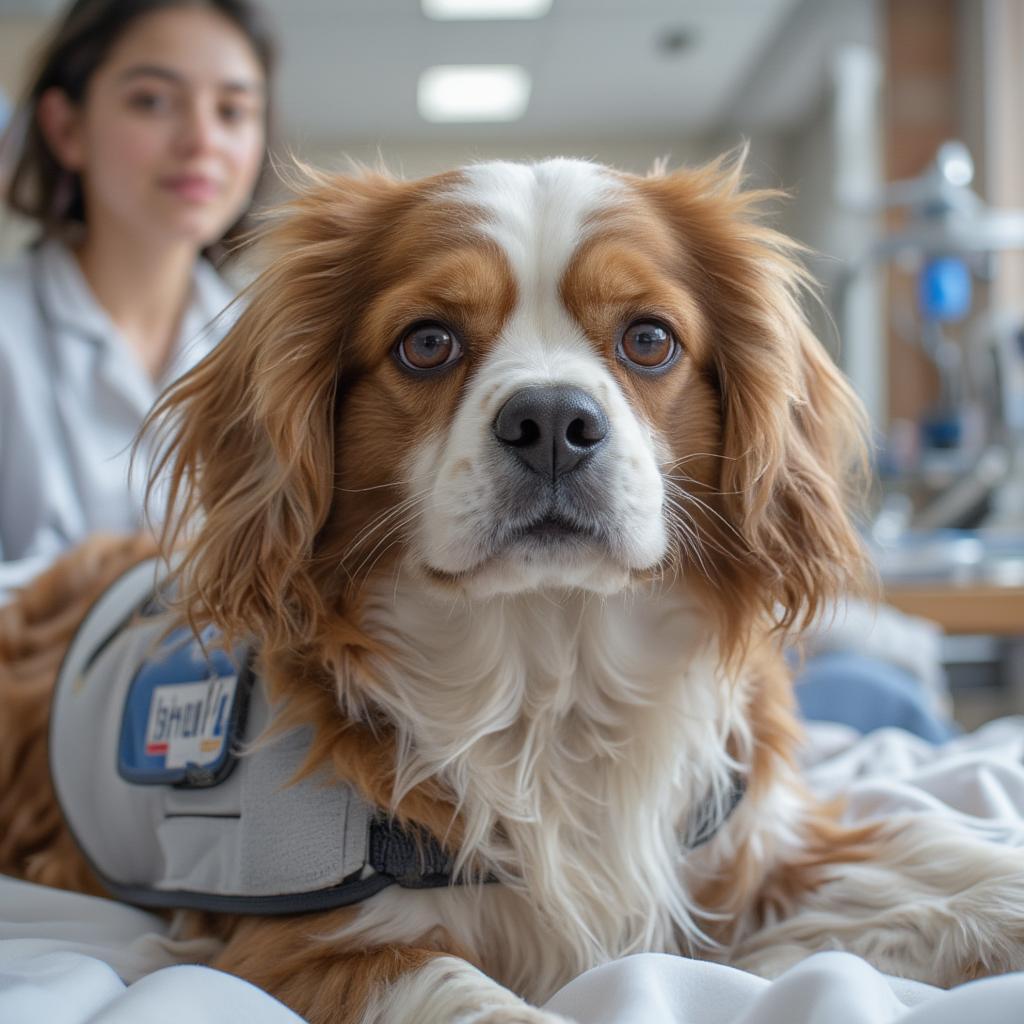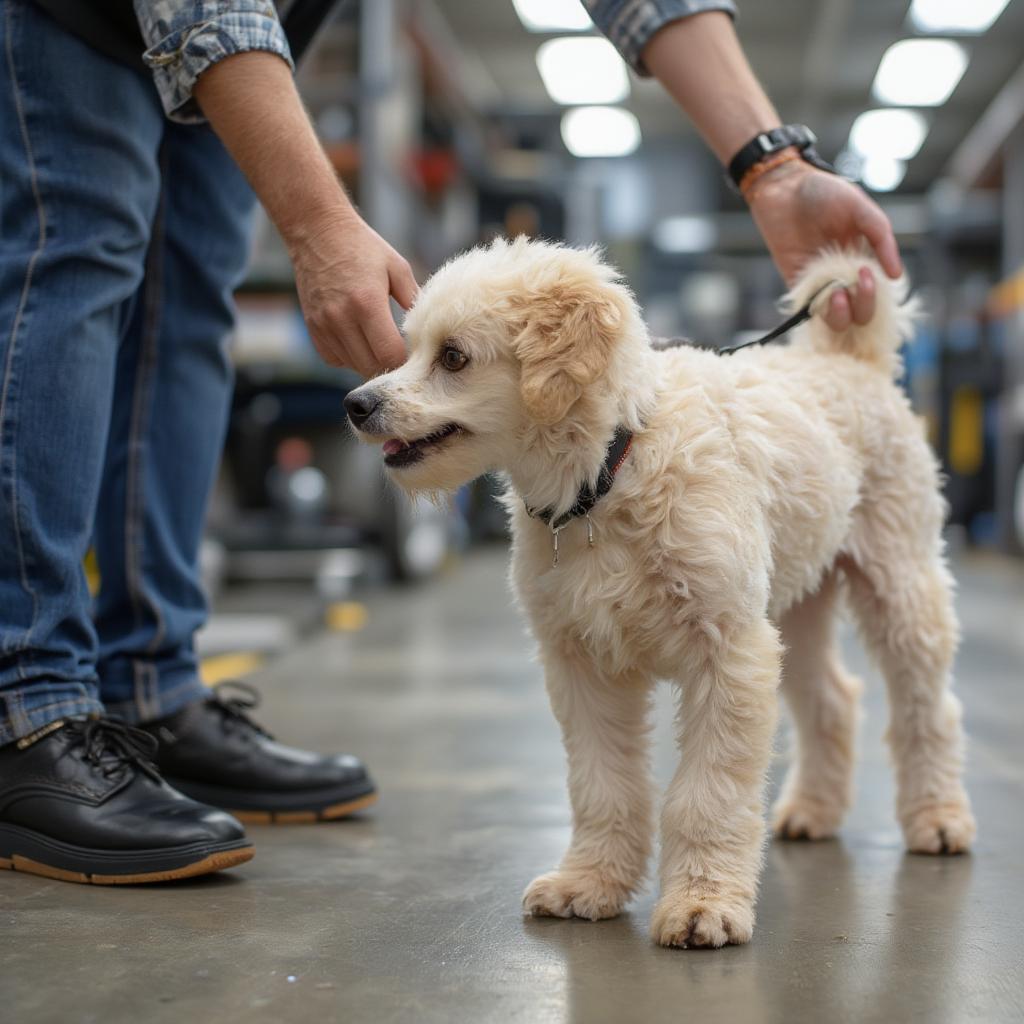Therapy dogs provide invaluable comfort and support to people in various settings, from hospitals and nursing homes to schools and disaster relief zones. While many breeds excel in this role, small dog breeds offer unique advantages, often being more easily adaptable to different environments and less intimidating to those they serve. This article explores some of the Best Small Dog Breeds For Therapy Work, considering their temperament, trainability, and overall suitability for this important task.
 Cavalier King Charles Spaniel Therapy Dog Visiting a Patient in the Hospital
Cavalier King Charles Spaniel Therapy Dog Visiting a Patient in the Hospital
Temperament and Trainability: Key Considerations for Therapy Dogs
When choosing a therapy dog, temperament is paramount. A calm, gentle, and patient demeanor is essential. The dog should be comfortable with being touched by strangers, tolerant of loud noises and sudden movements, and adaptable to new environments. Trainability is equally crucial. Therapy dogs require extensive training to obey commands reliably, remain focused in distracting situations, and interact appropriately with a diverse range of people. They should be well-socialized from a young age, exposed to various sights, sounds, smells, and people to ensure they develop into confident and well-adjusted adults. Similarly to good small dog breeds for service dogs, therapy dogs need to have a stable and friendly personality.
What Makes Small Dogs Suitable for Therapy?
Small dogs often possess several traits that make them well-suited for therapy work. Their smaller size can be less intimidating, especially for children or individuals with anxiety. They are often easier to manage in confined spaces and can be more easily transported to different locations. Many small breeds are also known for their affectionate and sociable personalities, making them natural companions. However, it is important to remember that individual temperament varies within each breed, and careful selection and training are essential for any dog considered for therapy work.
Top Small Dog Breeds for Therapy Work
Several small dog breeds consistently demonstrate the qualities needed to excel as therapy dogs. Here are some of the most popular choices:
-
Cavalier King Charles Spaniel: Known for their gentle and affectionate nature, Cavaliers are eager to please and thrive on human companionship. They are generally adaptable and well-behaved, making them excellent therapy dogs for a variety of settings.
-
Poodle (Toy and Miniature): Highly intelligent and easily trained, Poodles are known for their hypoallergenic coats, making them a good choice for individuals with allergies. Their playful and affectionate personalities make them wonderful companions for those in need of comfort. You can find more about emotional support dogs at the best emotional support dog breeds.
-
Bichon Frise: These cheerful and playful dogs are known for their fluffy white coats and affectionate personalities. They are generally adaptable and enjoy being around people, making them well-suited for therapy work. They are also often recommended as good breeds for psychiatric service dogs.
-
Pug: With their wrinkly faces and charming personalities, Pugs are known for their affectionate and playful nature. They are relatively low-energy and enjoy cuddling, making them excellent companions for those seeking comfort and emotional support. This breed is similar to suggestions for best dog breeds for psychiatric service dogs.
Which Small Dog Breed is Right for You?
The “best” breed for therapy work depends on the specific needs of the handler and the environment in which the dog will be working. Factors to consider include the dog’s energy level, grooming requirements, and overall temperament. It’s crucial to research different breeds thoroughly and meet with individual dogs to assess their suitability for therapy work. Understanding the characteristics of best service dog breeds for anxiety and depression can further guide your choice.
The Importance of Proper Training and Certification
Regardless of breed, all therapy dogs require specialized training and certification. This training focuses on obedience, socialization, and specific skills needed to interact with individuals in therapeutic settings. Certification ensures that the dog meets specific standards of behavior and temperament and is qualified to provide therapy services.
 Miniature Poodle Therapy Dog in Training
Miniature Poodle Therapy Dog in Training
Conclusion
Small dog breeds can make exceptional therapy dogs, offering comfort and support to individuals in need. By carefully considering temperament, trainability, and specific breed characteristics, you can choose the best small dog breed for therapy work and embark on a rewarding journey of making a positive impact on the lives of others. Remember that proper training and certification are vital for ensuring the success of any therapy dog team.
FAQ
-
What is the difference between a therapy dog and a service dog? Therapy dogs provide emotional support and comfort, while service dogs are trained to perform specific tasks for individuals with disabilities.
-
How long does it take to train a therapy dog? Training time varies, but it generally takes several months to a year of consistent training and socialization.
-
Where can I find a reputable therapy dog training program? Search online for therapy dog organizations in your area or consult with your veterinarian for recommendations.
-
Are all small dog breeds suitable for therapy work? No, individual temperament and trainability are crucial, regardless of breed.
-
What is the certification process for therapy dogs? The certification process typically involves passing a temperament test and demonstrating specific skills in a controlled environment.
-
Can mixed breed dogs become therapy dogs? Yes, mixed breed dogs can be excellent therapy dogs if they possess the necessary temperament and training.
-
Where can my therapy dog provide services? Therapy dogs can work in various settings, including hospitals, nursing homes, schools, and airports.
